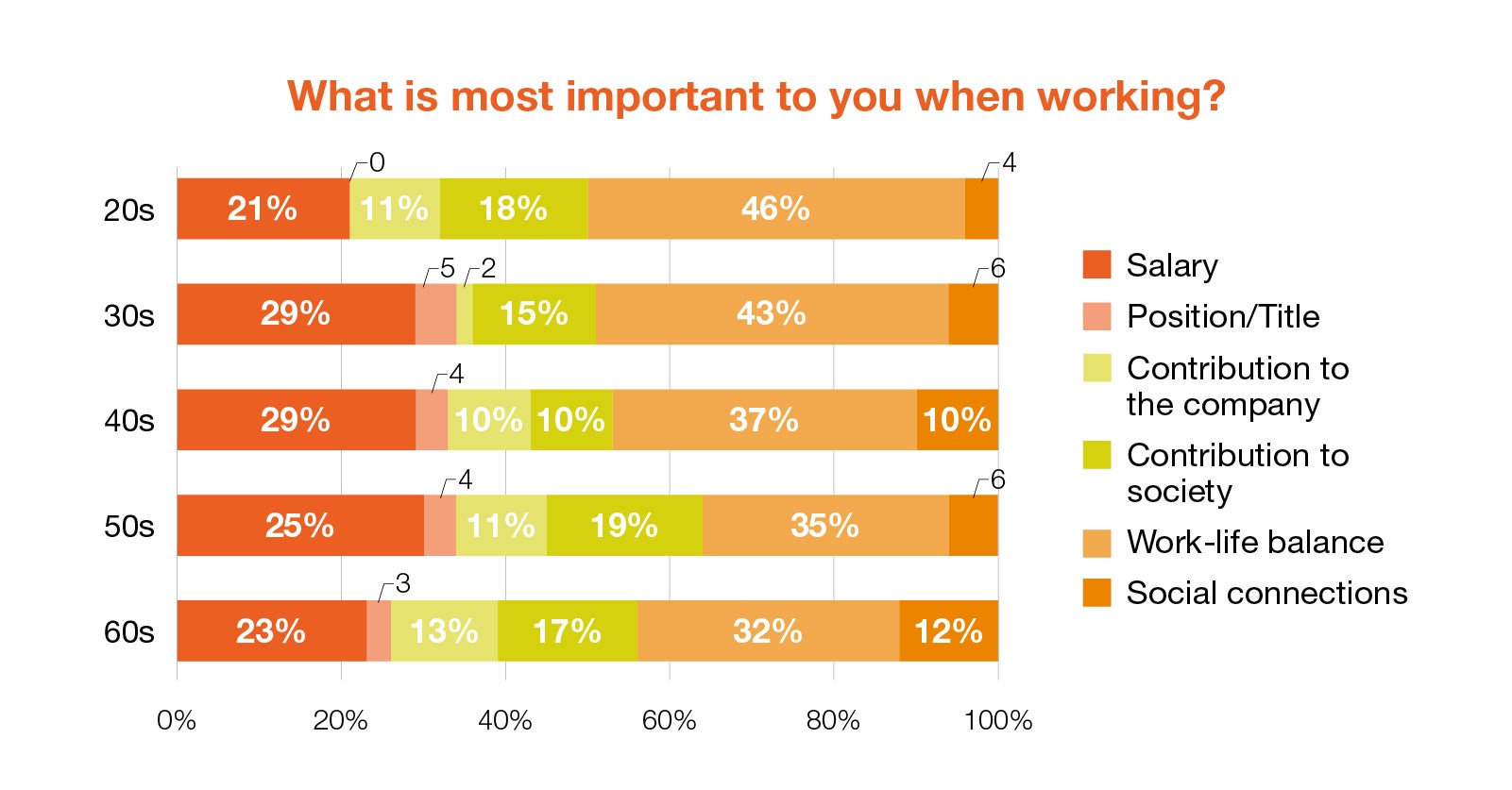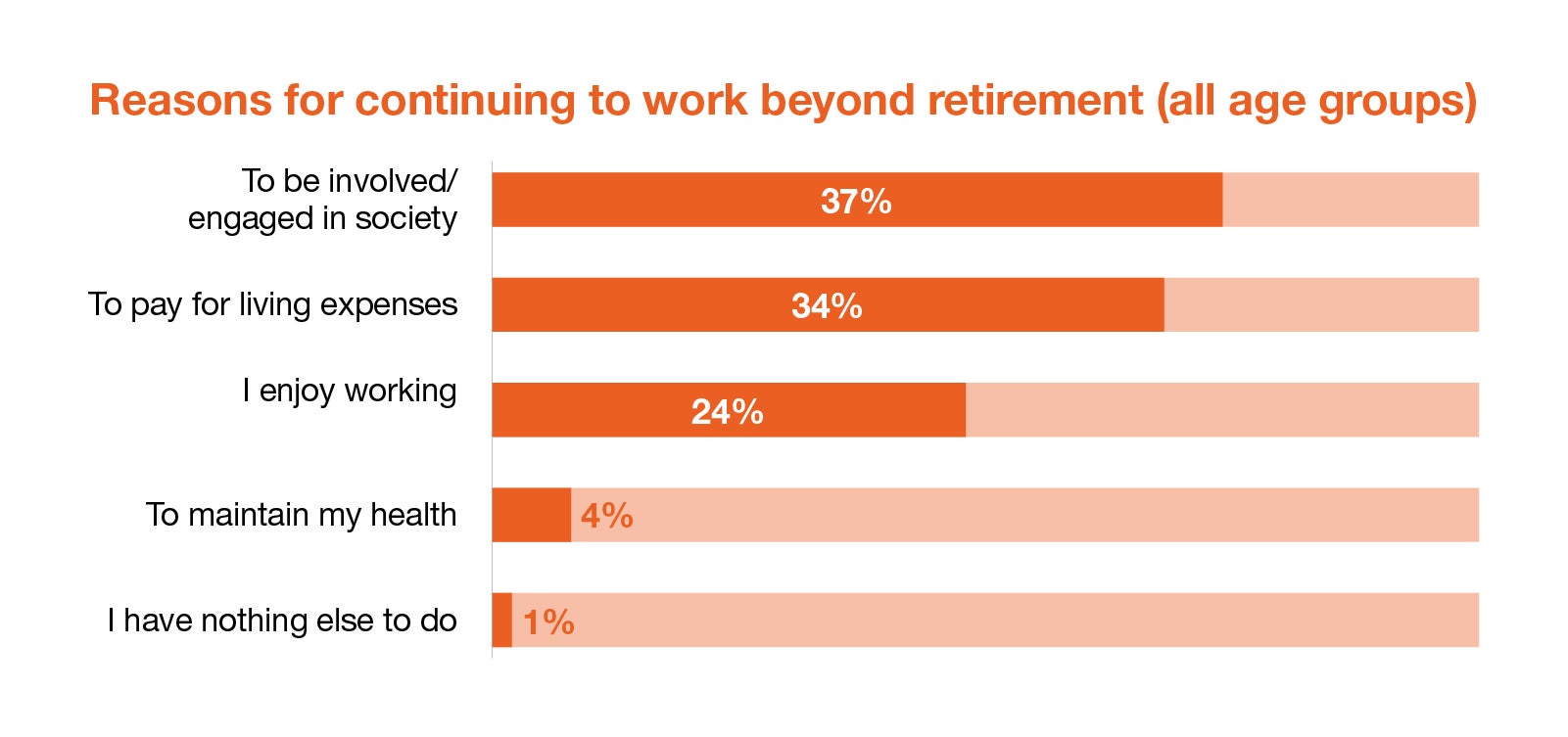What are the main motivations for working beyond retirement?
Survey conducted by Robert Walters Japan
On July 8, specialist professional recruitment firm Robert Walters Japan announced the second installment of the survey results on working beyond the retirement age. From April 2025, all companies in Japan will be required to allow employees who wish to continue working until the age of 65 to do so. A total of 728 full-time employees in their 20s to 60s, working for Japanese and foreign-affiliated companies, responded to the survey.
Work-life balance is important for employees in their 20s and 30s
When asked what they value most while working, male employees ranked “salary” (28%), “work-life balance” (27%), and “contribution to society” (21%) in first, second and third place respectively. Among female employees, “work-life balance” (45%) ranked first, “salary” (26%) ranked second, and “contribution to society” (11%) ranked third. While most female employees place importance on balancing their professional and personal lives, this differs from person to person among male employees.
By age group, those in their 20s and 30s were more likely to place greater importance on “work-life balance”, exceeding other generations by about 10%.
Reason for continuing to work: many employees seek social involvement
In our previous survey findings, we found that employees in their 20s and 30s are considering retiring by the age of 60, and half of male employees want to work until at least 70 years old. For those who are considering working beyond the retirement age, “to be involved/engaged in society” (37%) was cited as the most common reason to continue working. By age group, 40% of those in their 20s and 30s said their reason for continuing to work is “to pay for living expenses” while 33% responded “to be involved/engaged in society.” Respondents in their 40s and above tend to place more importance on social connections; among those in their 40s, social involvement (37%) ranked above living costs (34%). Among the 50s age group, social involvement (39%) and living costs (35%) were the main reasons, and among the 60s age group, social involvement (36%) ranked first, followed by enjoyment of work (31%).
Although the rankings differ by age group, many company employees still desire to be engaged in society after retirement, indicating that work is an opportunity to connect with people.
The survey results suggest that younger professionals are considering retiring earlier and placing more emphasis on work-life balance. In addition, since many employees cited involvement with society as one of the reasons for continuing to work, companies can use this opportunity to minimise talent shortages by providing professionals who wish to work beyond retirement with opportunities to continue their careers.
(Survey period: 26 April – 2 May 2022, Target: Company employees registered with Robert Walters Japan and living in Japan n=728)
Related content
View allTOKYO, JAPAN - Specialist recruitment firm Robert Walters Japan unveils key insights into the experiences and expectations of LGBTQ+ individuals, diversity and inclusivity in the Japanese workplace through its latest survey*. The Importance of Diversity and Inclusivity The survey asked respondents t
Read MoreTOKYO - Specialist professional recruitment firm Robert Walters announced trends in the hiring of foreign national candidates on April 10. In recent years, as the domestic workforce has been shrinking, companies have been focusing on boosting diversity in their hiring process. In this release, we ta
Read MoreOSAKA - Specialist professional recruitment firm Robert Walters Japan is pleased to announce the relocation of its Osaka office to Northgate Building Office Tower, next to JR Osaka station, from 1 April 2024. The Osaka office is a key hub serving clients and candidates in central and western Japan s
Read More

